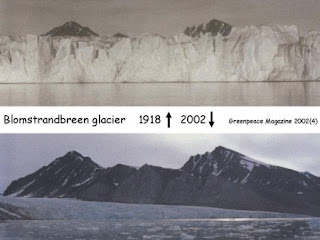-The combined global land and ocean surface average temperature for September 2008 tied with September 2001 as the ninth warmest since records began in 1880
-Arctic sea ice coverage during September was at its second lowest extent since satellite records began in 1979.
-With just 0.47 inch of rain, Melbourne, Australia had its driest September since records began in 1855
Also in the report are the month's major hurricanes, typhoons, fires and rains, plus more detail on the above.
The report ends with their modest statement: "NOAA understands and predicts changes in the Earth's environment, from the depths of the ocean to the surface of the sun, and conserves and manages our coastal and marine resources."
Here are some more findings from July, 2008 from the Netherlands Arctic Station in the world's northernmost village on Svalbard:
-The North Pole is warming 1,5 degrees faster than the rest of the world. Ice and snow melt faster and the sun warms the dark surface of ocean and earth. More insects are emerging on Spitsbergen.

-The polar bear is endangered. Population has declined 20% because the sea ice has been melting more. Now there are only 25.000 polar bears left.
And lastly:
-The arctic ocean is a potential gold mine for oil and gas. Yesterday, an USA-report stated that 20% of all reserves of the world are located in the Arctic. With the melting of the pole, these reserves become available. Many countries want to take part in the discussion on the future of the poles. Also The Netherlands.
Whoopee, more oil! Maybe I'll go and buy myself a car after all, just as soon as the last of the ice melts.










